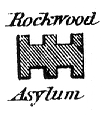| Joseph in
Rockwood Asylum July 1884 |
Source: Rockwood Asylum (Kingston Psychiatric Hospital) , Male Casebook 1855-1885, p 464 #1643, Joseph Judd
Abt. 50 - Bapt. English. married - Has been insane about two years, getting worse gradually. Has a great desire to wander about. Imagines he owns a great deal of property and money. Has always been temperate -- D. Richardson. "He wandered away some days getting his feet frozen. He has often got up in the night and wandered off without any object. He has been unable to do his work and since that he has tried to work at home but could never do it properly. He would varnish the work in the rough and try to put it together wrongly. He has become very irritable. At first two years ago, his gait was very unsteady like a man who has been drinking. He has fancied he had bought and owned property which he had not [?]" D McCullum. He is very weak minded, and his memory is quite defective. He fancies that he is the best mechanic living. His is a case, evidently of Paresis-- Admitted by Warrant from Co. York
|
||||
| Joseph diagnosed
with Paresis |
Paresis is a disorder characterized primarily by impaired mental function, caused by damage to the brain from untreated syphilis. A venereal disease documented since the 15th Century, syphilis has three distinct stages if not treated: chancre sores, a rash, and then infections in the internal organs. Infections of the brain, known under the broader heading of neurosyphilis, occurs late, from 5 to 30 years after the original syphilis infection. Effective treatment to kill the syphilis bacterium wasn't available until salvarsan was introduced circa 1911, and penicillin after that. In Joseph's day, potassium iodide was the physicians choice, but it appears any treatment he received did not rid him of the bacteria. Still today, infection with gonnorrhea may hide the symptoms of a syphilis infection, and perhaps this played some roll in Joseph's continuing affliction. | ||||
| If this is an accurate diagnosis, then we must assume Joseph contracted
syphilis about 5 to 30 years before his acute paresis, placing it from
the mid 1870's to as early as his youth in 1850's London. There is no evidence
that Emma or their children were so affected.
We must judge this story for ourselves. Still, even today's symptoms of general paresis makes one hark back to Joseph's assessment and his first week at Rockwood. |
|||||
| General Paresis
|
Source: http://www.healthanswers.com/database/ami/converted/000748.html
|
||||
| Joseph's first week | Source: Rockwood Asylum (Kingston Psychiatric Hospital) , Male Casebook
1855-1885, p 464
Is unable to pass urine & the catheter had to be used today. Locomotion almost impossible. Patient far advanced in Paresis. Muscular force almost completely lost. Tongue provided[?] to one side. Delusions of grandeur marked. Pupils irregular and unequal. July 12th, 1884
|
||||
| Conditions at
Rockwood |
Joseph's ward consisted of individual rooms measuring 12 ft by 7 ft,
on a long hallway, similar to today's hospitals. When he was able, Joseph
could work in the asylum's carpentry shop, or help make brushes and brooms,
all supervised by the occupational therapy department. Life for Joseph
and the other patients of Rockwood was very much improved from past years,
thanks to the reforms brought about by the superintendent, Dr. William
Metcalf and his assistant Dr. Charles Kirk Clarke (namesake of the Clarke
Institute in Toronto).
Improvements made over the three years before Joseph's arrival included new hair mattresses to replace the straw ones, more comfortable clothing no longer made of canvas, and better meals of soup, boiled beef, potatoes and bread, not mashed food. Patients were even supplied with cutlery, though asylum staff were charged with counting the knives and forks at meal's end. |
||||
| Health improves | As his health improved over the next few months, Joseph may also have
been treated to a performance by the asylum dramatic club, or any number
of entertainers from the surrounding community. Metcalf writes on one occasion:
|
||||
| Assaulted by patient
Aug 1884 |
Has been maniacal[?] for a few days and very aphasic [lacking speech]. He has been so noisy at nights that other patients have been greatly [???]. Last night patient Ohaiboneau[?] struck Judd with a chamber [pot] and cut his head terribly. |
||||
| Joseph recovered from his assault and continued working in the carpentry
shop through the next winter, missing the marriage of his daughter Gussie
in September. Although his short term memory was "highly defective", his
memory of the past was rich and entertaining to the staff.
As the next summer approached, Joseph's health worsened. His paresis symptoms returned, accompanied by epileptic type convulsions and paralysis of the throat muscles. He was bed-ridden for a month and died on June 27th, 1885. |
|||||
| Joseph dies
June 1885 |
Burial of all patients who died while at Rockwood was arranged with the Cataraqui Cemetery a few kilometres north-west of Portsmouth. Joseph was buried there in an unmarked "asylum" plot. | ||||
William Metcalf is interred in Cataraqui Cemetery, as are former Prime Ministers John A. MacDonald and Alexander MacKenzie, and the enigmatic Grandpa Judd. |
